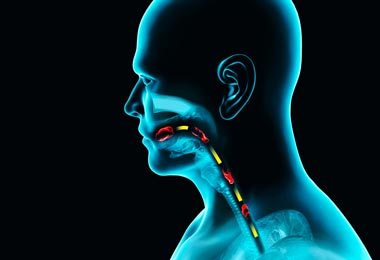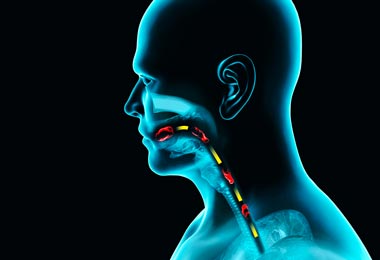Indigestion
What is indigestion?
Indigestion (dyspepsia) is a pain or burning feeling in your upper belly or abdomen. It is common in adults. Indigestion is not the same as heartburn. It is not related to stomach acid. Heartburn is when stomach acid goes out of your stomach and back into your food pipe (esophagus). You can have symptoms of both indigestion and heartburn at the same time.
What causes indigestion?
Indigestion can be caused by health problems, lifestyle issues, or medicines.
Health problems or diseases include:
- Sores or ulcers in your stomach or small intestine
- Redness and swelling or inflammation in your stomach (gastritis)
- Acid flowing back from your stomach into your esophagus (GERD or gastroesophageal reflux disease)
- Bacterial infection in your stomach (H. pylori or Helicobacter pylori )
- Inflammation of your gallbladder (cholecystitis)
- Lumps of solid material (gallstones) in your gallbladder
- Swelling of your pancreas (pancreatitis)
- Food moving too slowly out of your stomach (gastroparesis) (common in people with diabetes)
Lifestyle issues include:
- Smoking
- Having too much caffeine
- Drinking too much alcohol
- Eating too fast
- Eating too much
- Eating spicy, fatty, or greasy foods
- Eating high-fiber foods
- Feeling very stressed
Medicines include:
- Bacteria-fighting medicines (antibiotics)
- Aspirin and over-the-counter pain and fever medicines (NSAIDs or nonsteroidal anti-inflammatory drugs)
What are the symptoms of indigestion?
Each person’s symptoms may vary. Symptoms may include:
- Feeling full too soon while eating
- Feeling pain, burning, and discomfort in your upper belly or abdomen
- Feeling bloated
- Burping and loud stomach gurgling
- Having an upset stomach or vomiting
- Having diarrhea
- Having gas
The symptoms of indigestion may look like other health problems. Always see your healthcare provider to be sure.
How is indigestion diagnosed?
Your healthcare provider will look at your past health and give you a physical exam.
To make sure other health problems aren’t causing indigestion, you may have tests including:
- Blood tests
- Stool or breath tests. These are done to check for a stomach bacteria (H. pylori)
- X-rays of your stomach and small intestine
- Upper endoscopy. This test uses a long, thin, flexible tube called an endoscope. It has a light and small camera on the end. The tube is put into your mouth, down your food pipe (esophagus), and into your stomach. It checks for any problems in the esophagus or stomach.
- Ultrasound of your gallbladder
- Stomach emptying scan
How is indigestion treated?
You should not have foods or medicines that cause indigestion. It is also helpful to avoid stressful situations. Your symptoms may feel better if you:
- Quit smoking
- Take medicines that weaken or neutralize stomach acid (antacids)
Your healthcare provider may suggest you take medicines that:
- Help your stomach move food more quickly into your small intestine
- Decrease the amount of acid in your stomach
- Kill bacteria (antibiotics) if tests show you have the H. pylori (Helicobacter pylori) bacteria in your stomach
- Help calm the gut's nervous system
What can I do to prevent indigestion?
There are many things you can do to try to prevent indigestion.
Making changes in your diet and eating habits can help. These include:
- Eating several small, low-fat meals each day instead of 3 large meals
- Eating slowly and giving yourself enough time for meals
- Limiting spicy, fatty, greasy, or high-fiber foods
- Chewing your food well
- Limiting or not having any coffee, soda, or alcohol
Avoid medicines that hurt your stomach. These include aspirin and over-the-counter pain and fever medicines (NSAIDs or nonsteroidal anti-inflammatory drugs). If you do take them, do so after you eat.
Other lifestyle changes that may keep indigestion from happening include:
- Quitting smoking
- Getting enough rest
- Finding ways to lower your emotional and physical stress, such as meditation or yoga
- Exercising before a meal or waiting at least 1 hour after eating
When should I call my healthcare provider?
Indigestion can be a sign of a serious health problem. Call your healthcare provider right away if you have indigestion and any of these symptoms:
- Frequent vomiting
- Blood in vomit
- Weight loss or not feeling hungry
- Bloody, black, or tarry stools (could mean you have blood in your stool)
- Sudden sharp pain in your belly or abdomen
- Trouble breathing
- Sweating
- Pain that spreads to your jaw, neck, or arm
- Difficult, painful swallowing
- Yellow coloring of your eyes or skin (jaundice)
Also call your healthcare provider if you have indigestion that lasts longer than 2 weeks.
Key points
- Indigestion is a painful or burning feeling in your upper belly or abdomen.
- It is not the same thing as heartburn.
- Indigestion may be caused by health problems such as ulcers or lifestyle and eating habits.
- You should not have foods or medicines that cause indigestion. It is also helpful to avoid stressful situations.
Next steps
Tips to help you get the most from a visit to your healthcare provider:
- Know the reason for your visit and what you want to happen.
- Before your visit, write down questions you want answered.
- Bring someone with you to help you ask questions and remember what your provider tells you.
- At the visit, write down the name of a new diagnosis, and any new medicines, treatments, or tests. Also write down any new instructions your provider gives you.
- Know why a new medicine or treatment is prescribed, and how it will help you. Also know what the side effects are.
- Ask if your condition can be treated in other ways.
- Know why a test or procedure is recommended and what the results could mean.
- Know what to expect if you do not take the medicine or have the test or procedure.
- If you have a follow-up appointment, write down the date, time, and purpose for that visit.
- Know how you can contact your provider if you have questions.





